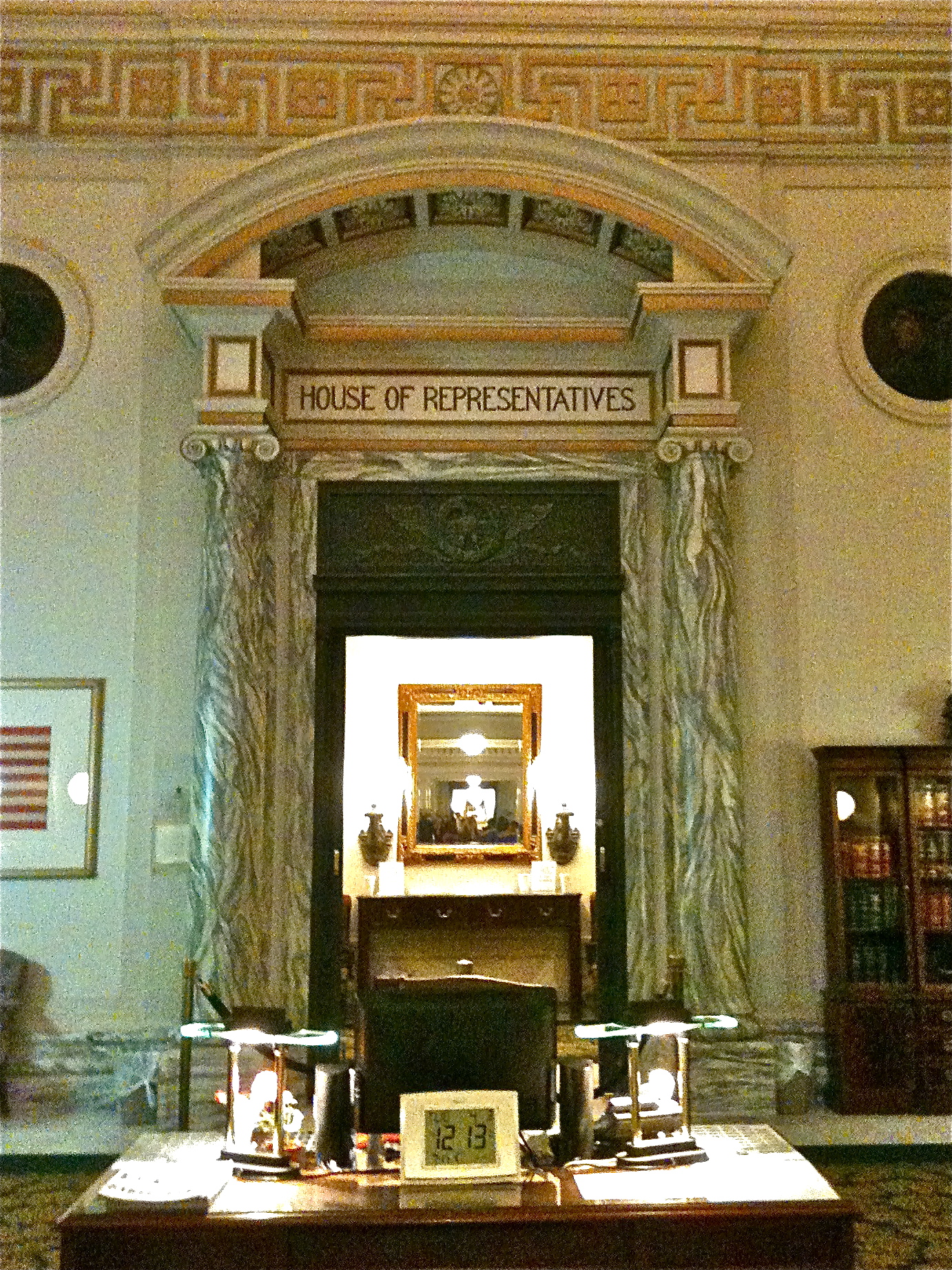Three weeks ago I wrote about the Personhood bill making its way through Oklahoma and how I felt about it. I mentally prepared myself for negative backlash and am happy to report that all the feedback I received was positive and uplifting. Thank you, that gave me hope.
Since that post I have had an interesting three weeks. I’ve made a new friend, Susan, the author of the letter to the editor mentioned in my Personhood post. You think I’m hot to trot on this issue? This gal is on fire! Susan and I visited the state capitol twice and she showed me the in’s and out’s of speaking with Representatives without an appointment. The first visit I was very nervous but pleasantly surprised to learn that you can walk right into someone’s office and ask to speak with them. We spent a lot of time going from office to office, educating Representatives about the IVF process, freezing embryos and when pregnancy actually occurs compared to conception. What was most surprising was that most of the time they were happy to have us sit down, listen, and talk to us.
 (Gateway to the House of Representatives)
(Gateway to the House of Representatives)
The second time we visited was during the morning session. The desk in front of the House floor entrance was a buzz with activity. Apparently, it’s common for lobbyists, constituents, Oklahomans with an agenda, and various other political types to request Representatives to leave the House floor to talk to them. That’s exactly what we did since I was keen to talk to my Representative regarding Personhood. Once he came out to see us (we had to wait a while) he only had a few minutes to talk but suggested we meet him in his office later that morning so he could hear what we had to say. He was up front that he would probably vote for this bill. I expected that but gave him a lot of food for thought before he actually casts that vote.
So here’s the 4-1-1 on SB1433. Two weeks ago the bill went to House Committee where it was discussed and an amendment was added that reads (in part) “Nothing in this section shall be construed to prohibit contraception or in vitro fertilization. The authority to regulate in vitro fertilization procedures is reserved by the Legislature.”
At first reading one would assume this solves the IVF problem. I have to disagree. The amendment does not define IVF or contraception. By definition in vitro fertilization means fertilization in glass. The definition of IVF does not involve cryopreservation (freezing) of embryos even though it can be an integral part of the process (as it was in my case). Also, there is not an exception to save the life of the mother in a life threatening situation. Alarmingly, the amendment reserves the right for the state to regulate IVF procedures. Why in the world would the state need to regulate IVF? This is a big red flag.
Here’s the cold hard truth. This bill is more than likely going to go to the House for discussion and a vote. I don’t know when that will happen but I would guess soon. Because this is an election year and a vast majority of our legislators (Republican and Democrat alike) don’t want to vote against a bill that has been labeled “pro-life” this bill will more than likely pass. I’ll give you a moment to let that sink in.
Since my visit to the capitol I’ve been looking for a silver lining. Here is what I’ve come up with so far. If this bill is going to pass then why not make it safe for IVF, cryopreservation, contraception and the mother if in a life threatening situation. All we need are some definitions here people.
If I have lit even the smallest fire under you (and you live in Oklahoma) I urge you to contact your representative. You would be very surprised at how willing they are to listen to their constituents (especially in an election year). If you’re not sure how to get a hold of them this website will help you find both your US and state reps.
Friends, this is how democracy works. Be a part of the solution.
Click here for an update to this update.






Lets put the Personhood Act under the microscope « Hugs, Kisses and Snot
[…] Interested to learn more? Check out my Personhood Update […]
Author MelindaTripp
Good work, I have learned a lot……pro life …there is more to it! Thanks!
Hugs, Kisses and Snot
Thanks. You’re right. There is a lot more to being pro-life. It’s important to be informed.
Author MelindaTripp
Keep your head down out there in the Midwest!
fertilization process
You could certainly see your enthusiasm in the work you write. The sector hopes for even more passionate writers like you who aren’t afraid to say how they believe. Always follow your heart.
Ann
Thank you for inviting us to think critically about this issue. Thinking critically means to look at an issue from as many perspectives as possible, without bias, then to bring yourself to the most correct position. I noticed that in your articles, you brought in the position against the bill from a contributor, but, I did not see any information from someone who is in favor of the bill. I hate to upset your clean record of non-dissent, but if no one else is willing or able to present an alternate position, I am willing to try. I have just come across your blog, and am not a regular reader. I don’t know your audience, so, I don’t know why there were no alternate opinions, but with such a controversial subject, there should be. Here’s my attempt to present an alternate view:
You wrote: “With what authority did the author of this bill, Senator Brian Crain of Tulsa, site to make such a bold statement that life begins at conception?”
From the contributor: “And while there is no denying cell division begins at conception, there is also no denying it cannot continue – a baby cannot develop and grow – unless and until pregnancy occurs.”
The contributor inferred that conception or fertilization is separate from pregnancy, that pregnancy begins with implantation. You are correct that not all medical professionals agree with life beginning with conception. Although there are some schools of thought that have morphed to this position, that pregnancy begins with implantation, it is not the main stream (or democratic) thinking in the global or national medical community:
“Human development begins after the union of male and female gametes or germ cells during a process known as fertilization (conception).” [Moore, Keith L. Essentials of Human Embryology. Toronto: B.C. Decker Inc, 1988, p.2]
“The question came up of what is an embryo, when does an embryo exist, when does it occur. I think, as you know, that in development, life is a continuum…. But I think one of the useful definitions that has come out, especially from Germany, has been the stage at which these two nuclei [from sperm and egg] come together and the membranes between the two break down.”
[Jonathan Van Blerkom of University of Colorado, expert witness on human embryology before the NIH Human Embryo Research Panel — Panel Transcript, February 2, 1994, p. 63]
“Although life is a continuous process, fertilization is a critical landmark because, under ordinary circumstances, a new, genetically distinct human organism is thereby formed…. The combination of 23 chromosomes present in each pronucleus results in 46 chromosomes in the zygote. Thus the diploid number is restored and the embryonic genome is formed. The embryo now exists as a genetic unity.”
[O’Rahilly, Ronan and Müller, Fabiola. Human Embryology & Teratology. 2nd edition. New York: Wiley-Liss, 1996, pp. 8, 29. This textbook lists “pre-embryo” among “discarded and replaced terms” in modern embryology, describing it as “ill-defined and inaccurate” (p. 12}]
“Almost all higher animals start their lives from a single cell, the fertilized ovum (zygote)… The time of fertilization represents the starting point in the life history, or ontogeny, of the individual.”
[Carlson, Bruce M. Patten’s Foundations of Embryology. 6th edition. New York: McGraw-Hill, 1996, p. 3]
Professor Micheline Matthews-Roth, Harvard University Medical School: “It is incorrect to say that biological data cannot be decisive…. It is scientifically correct to say that an individual human life begins at conception…. Our laws, one function of which is to help preserve the lives of our people, should be based on accurate scientific data.”
We can all agree that human life is a process, with unique phases, infancy, childhood, adolescence, etc. At the moment of fertilization, the process has begun. Soon after, within the first 48 hours, a protein is released in the blood, telling the body that there has been a significant change. EPF, early pregnancy factor, is secreted to inform the reproductive system that it has changed, and the usual menstrual cycle has ended. Tests are available that can identify the EPF within days of pregnancy, but they are cost prohibitive. Currently, the test for pregnancy is hCG, human chorionic gonadotropin. This is the protein secreted at the time of implantation.
From the contributor: “Because family-planning methods such as IUDs and the morning-after pill might operate post-conception but pre-pregnancy, they would be outlawed under this bill.”
These methods create an environment that will not allow the new life to implant and find the new form of nourishment that is required of the blastocyst. Previously, the zygote carried it’s nutrition within itself. Now, things have changed, and dependent nourishment begins. The process continues. Artificial irritation by means of abortive agents terminate the new life. Although these methods can be distributed as easily as contraception, they are in truth abortive. In dissecting the word, we see that these methods can not be considered contraceptives – against conception. Conception/fertilization has already occurred.
You wrote: “Saying that a fertilized egg is a person and using bible passages as a point of reference or proof is disrespecting the passage as well as the belief system. Using the bible as scientific evidence to prove that a embryo is it’s own individual is a misuse of the scripture, irresponsible and should not come into play.” I read SB 1433. I did not see references to scripture in the bill. Can you explain your statement objectively?
Was the politician formed by his belief system? Yes, as were you, or your contributor, or anyone else for that matter. Are you asking your politicians to not have belief systems, or not to represent the beliefs of their constituents? Is that possible?
I hope I have been respectful, but strong in my attempt to present to your audience an objective argument from the position of the defense of life at all stages.
We are at a new threshold of history. We, the people of the new millennium, are major players in this history. This discussion is important, but it must be complete. We must be open to look for the truth in the midst of the darkness of this new horizon. We must not look at the issues, the beginning of life, abortive agents in these dark, intimate moments in the womb, IVF and cryogenic preservation, with sentimentality and desire alone.
Natural law will create it’s own order. Manipulation of it has unknown consequences. Are we prepared to accept the consequences? Have we considered them?
Susan Winston
Dear Ann,
I’m Susan, the “contributor” to whom you repeatedly refer in your response.
To begin, I want defend Stephanie, whom you chide for having included my views against personhood without also having presented the perspective of a personhood supporter. Stephanie’s article is an eloquent foray into a complicated and controversial topic in which her family has a particular stake. She chose to publish her post in this, her personal blog. Stephanie is not a reporter duty-bound to be “fair and balanced.” She is under no obligation to give equal time to the pro-personhood agenda in expressing her well-founded concerns about SB-1433.
That pro-personhood bloggers likewise have no obligation to present arguments opposed to their beliefs is readily apparent from any of the hundreds of their posts available on the subject. In fact, many personhood supporters automatically assume those of us who don’t agree with them are godless advocates for unfettered abortion rights, and make other such knee-jerk, accusatory assumptions that are not only unfair and imbalanced but also untrue.
Regarding the start of pregnancy you wrote: “Although there are some schools of thought that have morphed to this position, that pregnancy begins with implantation, it is not the main stream (or democratic) thinking in the global or national medical community.” First, since when do we arrive at scientific facts through the democratic process? Second, your quotes about life’s beginnings are hardly sufficient to establish “main stream . . . thinking in the global or national medical community” especially since you lifted them straight from the webpage of the U.S. Conference of Catholic Bishops — http://old.usccb.org/prolife/issues/bioethic/fact298.shtml — not a source to which most people turn in seeking medical knowledge.
All of which begs the question, what is your belief system, Ann, and how does it color your opinions on personhood?
If, as you state, “[t]hinking critically means look[ing] at an issue from as many perspectives as possible,” and Stephanie and I, as IVF moms, hold a point of view you readily dismiss as influenced by “sentimentality and desire alone,” I think it’s only fair that you, the anonymous responder who seeks an equal hearing in this forum, divulge the underpinnings of the perspective you promote.
Awaiting that disclosure, let’s look at what the American Congress of Obstetricians and Gynecologists has to say about when a woman becomes pregnant:
“To be sure, not every act of intercourse results in a pregnancy. First, ovulation (i.e., the monthly release of a woman’s egg) must occur. Then, the egg must be fertilized. Fertilization describes the process by which a single sperm gradually penetrates the layers of an egg to form a new cell (“zygote”). This usually occurs in the fallopian tubes and can take up to 24 hours. There is only a short window during which an egg can be fertilized. If fertilization does not occur during that time, the egg dissolves and then hormonal changes trigger menstruation; however, if fertilization does occur, the zygote divides and differentiates into a “preembryo” while being carried down the fallopian tube toward the uterus. Implantation of the preembryo in the uterine lining begins about five days after fertilization. Implantation can be completed as early as eight days or as late as 18 days after fertilization, but usually takes about 14 days. Between one-third and one-half of all fertilized eggs never fully implant. A pregnancy is considered to be established only after implantation is complete.”
http://www.guttmacher.org/pubs/tgr/08/2/gr080207.html#box1
Let’s also consider the list of medical organizations opposed to personhood:
American Congress of Obstetricians and Gynecologists (ACOG)
American Society for Reproductive Medicine
Society for Assisted Reproductive Technology
RESOLVE: The National Infertility Association
Oklahoma State Medical Association
Oklahoma ACOG
Colorado Medical Society
Denver Medical Society
Colorado Academy of Family Physicians
Colorado Society of Osteopathic Medicine
American College of Obstetrics and Gynecology – Colorado Chapter
American College of Emergency Physicians, Colorado Chapter
American College of Nurse Midwives, Colorado Chapter
Mississippi Nurses Association
Mississippi ACOG
And compare it to the list of medical organizations that support personhood:
Christian Medical and Dental Associations.
(I’ve attempted the above search several ways, and am not going to swear this group is the only medical organization that supports personhood. It is the only one I was able to find after an hour on the Internet, however. Not surprisingly, it’s also the only listed organization with a religious affiliation. Please feel free to add the names of other pro-personhood medical organizations as warranted).
You may believe a fertilized egg is a person in all respects. You may believe most birth control methods are anathema to society. You may believe IVF and embryo cryopreservation are immoral acts that kill microscopic people. No one is threatening to pass legislation that will prevent you from living your life according to those beliefs.
But to pass a statute granting fertilized eggs the same rights, privileges and immunities under law as belong to the post-born is to force the rest of society to live life your way. This, despite the fact that such legislation will end up regulating assisted reproductive treatments out of existence, outlawing most non-barrier methods of birth control, and jeopardizing the lives of pregnant women with life-threatening conditions.
Think about it. If a pre-viable fetus is a person with the exact same legal rights as the woman in whose womb it resides, what would happen in cases of toxemia (pre-eclampsia), ectopic pregnancies, cancer, ruptured uteruses, pulmonary hypertension, or a host of other life-threatening conditions in which therapeutic abortion is the only way to save the mother’s life? As it stands, many Catholic hospitals will not perform this life-saving procedure on pregnant women who are about to die. For the time being, at least, women in such dire circumstances have the option to transfer to non-Catholic hospitals in an effort to save their own lives. Once SB-1433 becomes law, physicians’ hands will be tied no matter the hospital. Any doctor who performs an abortion to save the life of a pregnant woman (a woman who may be a mother already with several children waiting for her at home) will be committing murder.
Denying couples life-creating IVF treatments, increasing the number of unwanted pregnancies by banning common methods of birth control, forcing doctors to sit on their hands while nature takes its course in pregnancies turned deadly . . . to my mind, none of these outcomes is pro-life. But they are all the inevitable result of placing fertilized eggs on the same legal footing as pregnant women.
You ask if we expect our politicians “to not have belief systems, or not to represent the beliefs of their constituents.” Speaking for myself, I am not asking politicians to do any of those things. What I am asking them to do is refrain from passing legislation that codifies beliefs that are in conflict with the reasoned opinion of the American medical community.
Perhaps you don’t realize that SB-1433 is not a constituent bill. Sen. Crain, the bill’s sponsor, has admitted in the press he is carrying the bill on behalf of an outside lobbyist. Rather than listen to his constituents, it seems Sen. Crain, with an opponent running against him in this year’s Republican primary, will do whatever it takes to ensure his campaign is well-funded by big-money lobbyists and agenda-driven groups.
As I’ve said before, there’s no denying cell division begins with fertilization. But I defy you to tell me the two miscarriages I suffered during my six-year struggle to get and stay pregnant – heart-breaking though they were – were the functional, legal, or emotional equivalent of the death of a post-birth child. One does not typically name, bury, or file death certificates for babies lost to first-trimester miscarriage. (In fact, in Oklahoma, the only time it is legal to file a fetal death certificate is in cases of stillbirth; even then, such certificates are sanctioned by separate legal authority and treated as distinct from death certificates for persons born alive).
Your insistence that fertilization and pregnancy are one in the same, with implantation being just a minor detail in the process, would have lead to some absurd results in my case. According to your beliefs, even though I wasn’t even in the room when it happened, I became pregnant with sixteen children the moment my husband’s sperm fertilized my eggs in a petri dish at the fertility lab. According to your beliefs, thirteen of my children died while they were pre-embryos. According to your beliefs, I was remained pregnant with triplets before my doctor ever transferred the three remaining blastocysts to my uterus on Day 5, never mind the fact that none of them implanted, as revealed by the pregnancy test I took ten days later.
The second time I underwent IVF (the first attempt having resulted in no born persons despite sixteen initial conceptions), my physician transferred three blastocysts to my uterus (only one of which implanted) and my husband and I decided to cryogenically preserve the remaining three for future use. According to your beliefs, by placing live persons in a freezer, my husband and I should have been criminally charged with child endangerment and attempted manslaughter. According to your beliefs, because freezing embryos is immoral, we should have transferred all six fresh blastocysts to my uterus at the same time, rather than transferring three and freezing three, this despite the risk of my becoming pregnant with sextuplets. (The “Octomom” doctor lost his medical license, btw).
The undeniable fact is that had your belief system been law six years ago, my son would not be alive today because it would’ve been illegal for us to freeze his embryo. But I suppose I’m letting “sentimentality and desire” cloud my critical thinking again.
Here’s a question for you: How do your reconcile your belief that a fertilized egg is the legal equivalent of a post-birth person with the irrefutable, biological fact that “at minimum, two-thirds of all human eggs fertilized during normal conception either fail to implant at the end of the first week or later spontaneously abort.” http://discovermagazine.com/2004/may/cover/article_view?b_start:int=2&-C= Especially since women are often completely unaware any such thing has happened.
And what do you think about other belief-driven medical restrictions that exist in other countries, such as prohibitions on autopsies and organ donation, which are viewed as impermissible violations of corpses that must be kept complete for successful passage into the afterlife? Or chow about the gruesome practice of female “circumcision,” which was promoted in this country throughout the 19th and into the 20th century based on the belief it would cure masturbation, lesbianism, epilepsy and hysteria. What if a majority of Americans wanted to codify those sorts of beliefs today?
As a final matter, you conclude with “Natural law will create it’s own order. Manipulation of it has unknown consequences. Are we prepared to accept the consequences? Have we considered them?” That sounds pretty ominous. Can you explain those questions objectively? In so doing, please describe the consequences to which you so obliquely refer, in order that we may consider them “without bias . . . to bring [ourselves] to the most correct position” on the issue of personhood.
Thank you.
Susan
Ann
Just a quick note to post that my references for my comments were from Princeton.edu through a bing search of “life begins at conception”. (I would not have thought to search the Catholic Church or their Bishops regarding medical facts.) I should have noted that in my reply.
Hugs, Kisses and Snot
Ann – Thanks for bringing another point of view. A debate isn’t really a debate if we don’t have arguments from both sides.
Regarding your question about using the bible as scientific evidence and if the politician was informed by his belief system…You’re right in saying that SB1433 does not have any language referring to biblical passages or citing faith as evidence. I was reaching beyond the bill and trying to make a point that the bible has no place in the case of the state telling us how we decide scientific matters. I was speculating as to the idea that the author of this bill allowed his religious believes shape the bill. I do think that legislatures should have belief systems, I think we all should. And those belief systems should help serve as our moral compass. However, using those beliefs to govern is a slippery slope. I have no problem with how one person believes over another or using your beliefs to shape and form who you are and the decisions you make day in and day out. I do it myself everyday and teach my children to use their elementary understanding of God and faith to make good choices. However, I do have a problem when religion or a belief system is used to keep a group of people under it’s thumb. When religion is used as a justification for “might makes right” or limiting freedom then we have a problem.
Thank you for your opinions.
Respectfully,
Stephanie
Charles S Cascio
Great greater greatest article telling the truth I have ever read. Thank You!
Charles S Cascio
I mean the post from Ann.
Thanks for saying what I couldn’t put into words.
ectopic pregnancy
I really like this post! Thank you for sharing 🙂
Update to the Personhood Update « Hugs, Kisses and Snot
[…] my first visit to the state capitol as an advocate for IVF families and campaigning against Personhood I have been a busy little bee. […]
Lets put the Personhood Act under the microscope | Hugs, Kisses and Snot
[…] Interested to learn more? Check out my Personhood Update […]
Update to the Personhood Update - Hugs, Kisses and Snot
[…] my first visit to the state capitol as an advocate for IVF families and campaigning against Personhood I have been a busy little bee. […]